Difference between revisions of "UBPML Referenz"
From OOEM
Jump to navigationJump to search
AndreasLeue (talk | contribs) |
AndreasLeue (talk | contribs) |
||
| Line 33: | Line 33: | ||
--> | --> | ||
| [[Image:UBPMLConstellationClass.png]] | | [[Image:UBPMLConstellationClass.png]] | ||
| Ein bestimmter Zustand des Systems, der durch eine Menge von Klassen (d.h. eine ''Konstellation'') in einem bestimmten Zustand beschrieben wird, sowie optional weiteren Bedingungen, die für diese Klassen sowie ihre Beziehungen untereinander gelten müssen. | | Ein bestimmter Zustand des Systems, der durch eine Menge von Klassen (d.h. eine ''Konstellation'') in einem bestimmten Zustand beschrieben wird, sowie optional weiteren Bedingungen, die für diese Klassen sowie ihre Beziehungen untereinander gelten müssen. Eine ''Konstellation'' ist eine UML Klasse, also im Metamodell abgeleitet von ''Klasse''. | ||
| UBPML | | UBPML | ||
|- | |- | ||
| Line 40: | Line 40: | ||
| UBPML | | UBPML | ||
|- | |- | ||
<!-- | |||
| [[Image:UBPMLStepStereotype.png]] | | [[Image:UBPMLStepStereotype.png]] | ||
| | | | ||
| UML | | [[UML]] standard | ||
|- | |- | ||
--> | |||
| [[Image:UBPMLStepClass.png]] | | [[Image:UBPMLStepClass.png]] | ||
| | | | ||
Ein Schritt (''Step'') beschreibt eine Veränderung (Transformation) des Systems von einer Konstellation in ein oder alternativ mehrere andere. Er stellt somit die elementare Einheit einer ''geplanten Veränderung'' dar. | |||
Eie ''Schritt'' ist eine UML Klasse, also im Metamodell abgeleitet von ''Klasse''. | |||
| specific UML usage conforming to standard | | specific UML usage conforming to standard | ||
|- | |- | ||
| [[Image:UBPMLStepObject.png]] | | [[Image:UBPMLStepObject.png]] | ||
| | | | ||
| | | | ||
|- | |||
| [[Image:UBPMLProcedure.png]] | |||
| | |||
| | |||
|- | |- | ||
| [[Image:UBPMLStepClassWithConstellations.png]] | | [[Image:UBPMLStepClassWithConstellations.png]] | ||
| Line 140: | Line 148: | ||
| extension to UML | | extension to UML | ||
|} | |} | ||
Revision as of 11:35, 8 December 2009
UBPML Notation
| Notation | Bedeutung | Konformität |
|---|---|---|

|
Eine Klasse | UML standard |

|
Eine Instanz einer Klasse | UML standard |

|
Eine Klasse in einem bestimmten Zustand | UBPML |

|
Eine Klasse in einem bestimmten Zustand. Dieser Zustand wird hier ebenfalls deklariert, und zwar in Form einer Bedingung, die dann und nur dann erfüllt ist, wenn der Zustand vorliegt. | UBPML |

|
Eine Instanz einer Klasse in einem bestimmten Zustand. | UML standard (seit 2.0 in Aktivitätsdiagrammen) |

|
Ein bestimmter Zustand des Systems, der durch eine Menge von Klassen (d.h. eine Konstellation) in einem bestimmten Zustand beschrieben wird, sowie optional weiteren Bedingungen, die für diese Klassen sowie ihre Beziehungen untereinander gelten müssen. Eine Konstellation ist eine UML Klasse, also im Metamodell abgeleitet von Klasse. | UBPML |

|
Eine Instanz einer Konstellation, also eine Menge von Instanzen in bestimmten Zuständen, die die Bedingungen der Konstellations-Klasse erfüllen. | UBPML |

|
Ein Schritt (Step) beschreibt eine Veränderung (Transformation) des Systems von einer Konstellation in ein oder alternativ mehrere andere. Er stellt somit die elementare Einheit einer geplanten Veränderung dar. Eie Schritt ist eine UML Klasse, also im Metamodell abgeleitet von Klasse. |
specific UML usage conforming to standard |

|
||
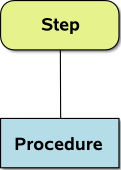
|
||

|
A step is the explicitly performed change between an initial and a final constellation | specific UML usage conforming to standard |

|
Same as above, but with instances instead of classes | specific UML usage conforming to standard |
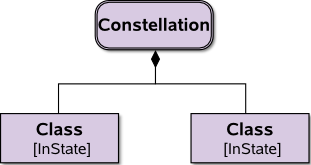
|
extension to UML | |
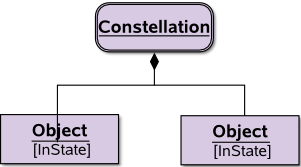
|
A constellation is an aggregation of certain objects within certain states | extension to UML |
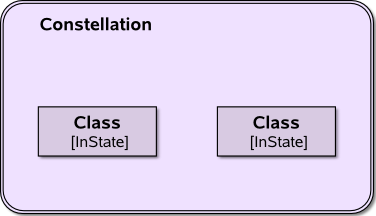
|
An alternative notation for a constellation | extension to UML |
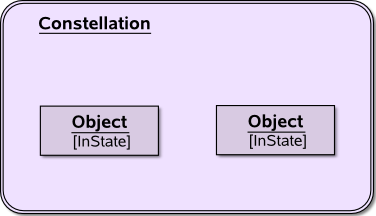
|
extension to UML | |
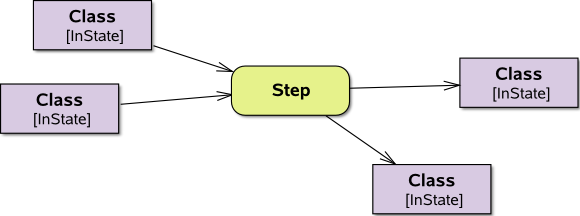
|
Constellations can be shown in detail | UML standard |
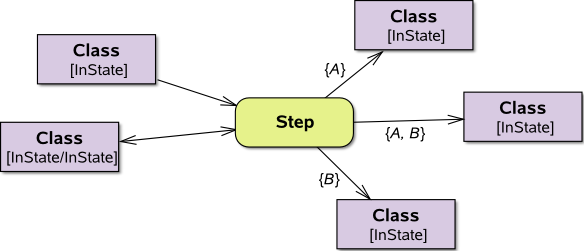
|
Steps can have different (mutually exclusive) final constellations; individual classes/instances may be shared by these constellations | UML standard |

|
All standard UML notation is valid, e.g. constraints | UML standard |

|
||
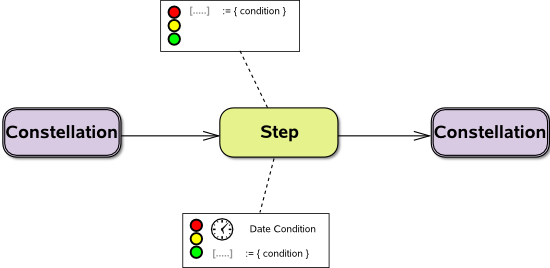
|
||
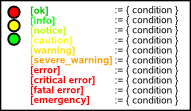
|
||

|
||

|
Of course actors and timing constraints can be placed here; optionally with nice symbols | UML standard |
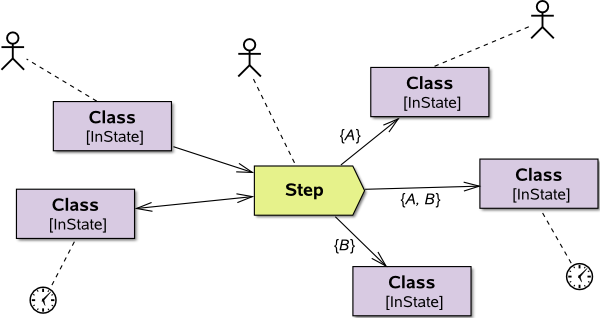
|
A more complex example of annotations | UML standard |
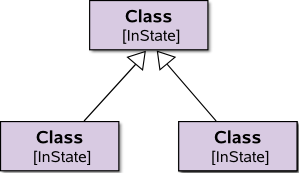
|
extension to UML | |
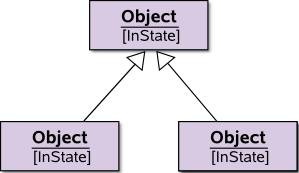
|
extension to UML | |

|
Steps can be derived from as is true for any normal class; derivation of classes and instances within a certain state expresses a substate relationship | extension to UML |

|
Partially completed work can be shown in a natural way | extension to UML |
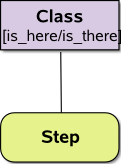
|
extension to UML | |
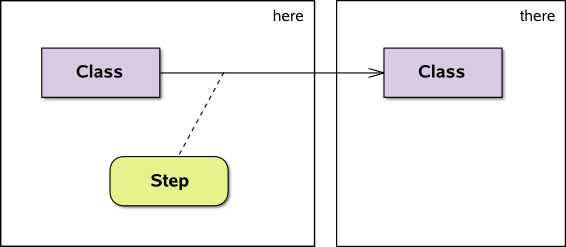
|
A notation for location changes, as a special case of state changes | extension to UML |